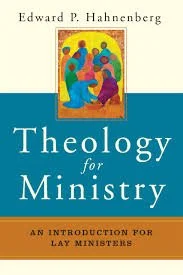A Theology for Ministry
A key text to be used in the formation of lay leaders will be Edward P. Hahnenberg's Theology for Ministry: An Introduction for Lay Ministers in which he articulates a foundational thesis that lay people are "Called by God, through Christ, in the Holy Spirit, with others, for others." This thesis serves as a guiding framework for understanding the role and mission of lay ministers within the Catholic Church.
1. Called by God
Hahnenberg emphasises that the call to ministry originates from God, who invites all baptised individuals to participate in the Church's mission. This divine call is rooted in the sacrament of Baptism, which confers a unique dignity and responsibility upon every Christian
The recognition of this call is essential for lay ministers, as it affirms their identity and purpose within the Church, encouraging them to embrace their roles with confidence and commitment
2. Through Christ
The work highlights that the call to ministry is mediated through Jesus Christ, who exemplifies the perfect model of service and leadership. Lay ministers are invited to follow Christ's example, embodying His teachings and values in their daily lives
Hahnenberg underscores the importance of a personal relationship with Christ, which is vital for sustaining the spiritual life of lay ministers and empowering them to fulfill their mission effectively
3. In the Holy Spirit
The role of the Holy Spirit is central to Hahnenberg's theology of ministry. The Holy Spirit empowers lay ministers, bestowing upon them the necessary gifts and charisms to serve the Church and the world
This aspect of the thesis emphasises the dynamic and communal nature of ministry, as the Holy Spirit works through the diverse gifts of the faithful, fostering collaboration and unity within the Church
4. With Others
Hahnenberg stresses that ministry is not an isolated endeavor; it is carried out in communion with others. Lay ministers are called to work collaboratively with clergy, fellow lay leaders, and the broader community of believers
This communal aspect of ministry fosters a sense of belonging and mutual support, allowing lay ministers to draw strength from one another as they engage in their shared mission
5. For Others
The ultimate purpose of the lay minister's call is service to others. Hahnenberg articulates that lay leaders are called to be agents of transformation in their communities, bringing the message of the Gospel to those around them
This service-oriented approach emphasises the importance of social justice, compassion, and outreach, as lay ministers strive to embody Christ's love and care for all, particularly the marginalised and vulnerable
Hahnenberg's thesis that lay people are "Called by God, through Christ, in the Holy Spirit, with others, for others" encapsulates a holistic understanding of lay ministry. It highlights the divine origin of the call, the centrality of Christ, the empowering presence of the Holy Spirit, the communal nature of ministry, and the ultimate goal of serving others. This framework not only affirms the dignity and mission of lay ministers but also encourages them to actively engage in the Church's mission with a spirit of collaboration and service.


